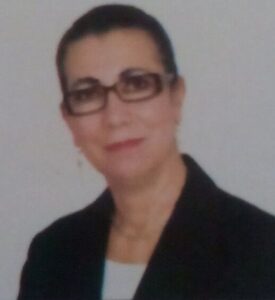Explore about the Famous Politician Louisa Hanoune, who was born in Algeria on April 7, 1954. Analyze Louisa Hanoune’s net worth, age, bio, birthday, dating, height-weight, wiki. Investigate who is Louisa Hanoune dating now? Look into this article to know how old is Louisa Hanoune?
Louisa Hanoune Birthday Countdown
Louisa Hanoune Biography
Hanoune was born in Chekfa, Jijel Province. Her parents were mountain peasants from Chekfa, Jijel Province, and she fled with her family to the city of Annaba, after her parental home was bombed by the French army during the Algerian War of Independence (1954–1962). She was the first woman of her family to go to school. With Algeria’s free and compulsory education system, Hanoune completed secondary school and went on to obtain her Bachelor’s Degree before joining the air transport sector. Hanoune studied law at the University of Annaba, a decision which was opposed by her father. She has stated that “It is this right to education which will completely change the position, the representation of women in our society and of which I am partly a product.”
Louisa Hanoune (Arabic: لويزة حنون ; born 7 April 1954) is the head of Algeria’s Workers’ Party (Parti des Travailleurs, PT). In 2004, she became the first woman to run for President of Algeria. Hanoune was imprisoned by the government several times prior to the legalization of political parties in 1988. She was jailed soon after she joined the Trotskyist Social Workers Organisation, an illegal party, in 1981 and again after the 1988 October Riots, which brought about the end of the National Liberation Front’s (FLN) single-party rule. During Algeria’s civil war of the 1990s, Hanoune was one of the few opposition voices in parliament, and, despite her party’s laicist values, a strong opponent of the government’s “eradication” policy toward Islamists. In January 1995, she signed the Sant’Egidio Platform together with representatives of other opposition parties, notably the Islamic Salvation Front, the radical Islamist party whose dissolution by military decree brought about the start of the civil war.
Subsequent to the riots of 1988, Algeria adopted a pluralist system in 1989 which made possible for Hanoune to establish the Workers’ Party. The Workers’ Party was founded in 1990 by writ of the Socialist Workers Organization. Their main platform concerns the class struggle between the workers or “exploited classes” and the owners or “oppressors”. It is an independent party which supports the Algerian national movement. Hanoune was the leader and spokesperson of the party since its inception and was elected Secretary General of the party in October 2005. In 2007, there were 23 parties contesting elections in Algeria.
At the international level, Louisa Hanoune was a founding member of the International Workers and Peoples in January 1991. She has participated as a representative of PT conferences against privatization, for the defense of trade union organizations, and campaigned for workplace standards. She is a committee member of the women workers and of the Africa Committee of the International Workers. She was involved with a coalition of unions that spoke out against the war in Iraq, including the International Confederation of Arab Trade Unions and the International Confederation of Workers (EIT).
Hanounes first bid for the 1999 presidential election was rejected by the Constitutional Council.
In the 2004 presidential election she however became the first female candidate in the entire Arab world to run for president. Only six candidates were recognized by the constitutional council.
Hanoune was one of eleven candidates who nominated for the 2009 presidential election. Her platform included defending the principle of national sovereignty and denouncing the policy of liberalization and privatization of public enterprises. She won 4.22% of the vote, coming second out of six candidates, as President Abdelaziz Bouteflika won a third term with 90.24% of the votes cast in an election which was denounced as fraudulent.
In March 2010, Haroune joined other women’s-rights activists in calling for repeal of Algeria’s Family Code on grounds of its failure to provide adequate protection for females.
In February 2011, she criticised a 12 February anti-Bouteflika demonstration in Algiers as social manipulation—”trying to manipulate the social discontent, which is real, to divert it in the service of imperialism”—and prescribed
In the 2014 presidential election, she finished fourth receiving only 1.37% of the votes. In the party’s press conference she accepted the defeat and insisted that the elections were carried through in a correct way and this time without any fraud. “Bouteflika has won, people have chosen stability,” she said.
Since September 2019 Louisa is currently imprisoned for political reasons by the new Algerian military regime.
What's Louisa Hanoune Net Worth 2024
| Net Worth (2024) | $1 Million (Approx.) |
| Net Worth (2023) | Under Review |
| Net Worth (2022) | Under Review |
| Net Worth (2021) | Under Review |
| Net Worth (2020) | Under Review |
Louisa Hanoune Family
| Father's Name | Not Available |
| Mother's Name | Not Available |
| Siblings | Not Available |
| Spouse | Not Available |
| Childrens | Not Available |





